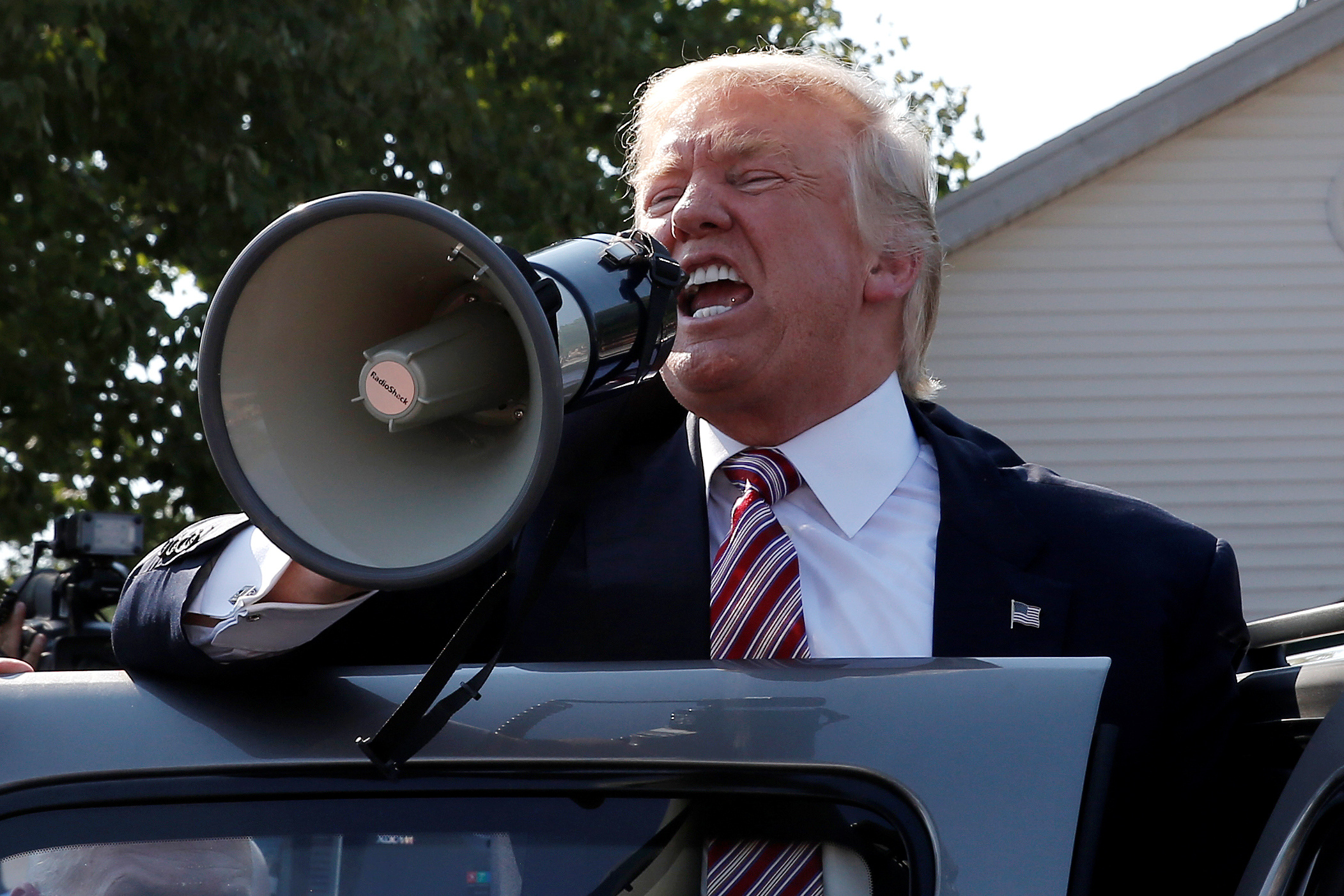Donald Trump has seized on an insane new conspiracy theory
Fed chair Janet Yellen is trying to swing the election by — get this — helping the economy. Truly diabolical!


In August of 2011, Texas Gov. Rick Perry (R), who had just entered the presidential race and would soon rocket to the front of the polls on his winning combination of retrograde views and spectacular hair, told a group of Iowa voters that there were nefarious economic doings afoot down in Washington. Federal Reserve chairman Ben Bernanke, he explained, was enacting the policy of "quantitative easing" — injecting large amounts of money into the economy — in an attempt to keep interest rates low and give Barack Obama a boost. "If this guy prints more money between now and the election, I don't know what y'all would do to him in Iowa, but we would treat him pretty ugly down in Texas," Perry said. "Printing more money to play politics at this particular time in American history is almost treacherous — or treasonous in my opinion."
Bernanke (who had been appointed by George W. Bush, by the way) was never tried for treason, and Perry's presidential bid soon foundered. But five years later, Donald Trump has decided to spread the same inane conspiracy theory: that the Fed chair, now Janet Yellen, is trying to swing the election by — get this — helping the economy. Truly diabolical.
In a CNBC interview Monday morning, Trump said that Yellen was holding off on raising interest rates at Obama's behest. "It's staying at zero because she's obviously political and she's doing what Obama wants her to do." The rationale, Trump explained, is that "they want to keep the market up so that Obama goes out and let the new guy, whoever that new — let's call it the new guy, okay, because I like the sound of that much better — but that the new person that becomes president, let him raise interest rates or let her raise interest rates and watch what happens to the stock market when that happens, okay?"
The Week
Escape your echo chamber. Get the facts behind the news, plus analysis from multiple perspectives.

Sign up for The Week's Free Newsletters
From our morning news briefing to a weekly Good News Newsletter, get the best of The Week delivered directly to your inbox.
From our morning news briefing to a weekly Good News Newsletter, get the best of The Week delivered directly to your inbox.
In other words, Trump believes Yellen is helping the economy now, but will raise interest rates enormously once the new president takes office (Trump brought up a prime rate of 21 percent as a hint of where it might end up). "She's keeping them artificially low to get Obama retired," he said. "She should be ashamed of herself, because it's not supposed to be that way."
Trump should really extend this analysis to other policy areas. If the military is trying to defeat ISIS, isn't that just a transparent ploy to help get Hillary Clinton elected? And what about the EPA — aren't they just trying to give Americans clean air and water so it'll make Obama look good? Isn't the overwhelming satisfaction seniors have with Medicare evidence that the Department of Health and Human Services is attempting to boost Obama's approval ratings by running a successful, popular social program? And don't get him started on food safety inspections — if the public weren't fooled by being able to buy meat and vegetables without getting food poisoning, they'd realize what a terrible job the Obama administration is doing.
With Donald Trump it's always hard to tell if he's saying what he does because he's ignorant, or whether he knows full well he's trafficking in nonsense. But if there's one policy area a real estate developer ought to have some kind of handle on, it's interest rates. And Trump has complimented Yellen for keeping rates low before. "She is a low interest rate person, she has always been a low interest rate person, and I must be honest — I am a low interest rate person," he said in another CNBC interview in May. "If we raise interest rates and if the dollar starts getting too strong, we're going to have very major problems."
Perhaps that was before Trump understood the full scope of the government plot to make things look good for the president. But that's the thing about conspiracy theorists: They don't think anything happens for mundane reasons, or for the reasons government officials say. If the Fed is trying to boost the economy, it can't be because boosting the economy is a good thing; there must be some sinister hidden purpose behind it.
A free daily email with the biggest news stories of the day – and the best features from TheWeek.com
It's a handy way to explain why the economy looks pretty good right now, with low unemployment and inflation all but non-existent. Sure, it seems like things are going in the right direction, but it's all a big lie, one that will unravel as soon as that dastardly Obama can no longer be held responsible for his eight-year scheme to destroy America.
As Trump explains to his voters, the whole thing is rigged from top to bottom, which is a story he has told them many times. But if you look closely, you'll see that the alleged rigging all seems to be about making things difficult for Donald Trump.
When Bernie Sanders talked about the system being rigged, he had a reasonably logical critique. It said that a permanent class of the wealthy and powerful shapes rules for politics and the economy that ensured that they will maintain their wealth and power. You might have thought Sanders' critique was overly simplistic at times, but at least it was coherent. Trump, on the other hand, identifies a rigged system in a completely haphazard fashion; the only thread that ties his accusations together is that they involve things not going Donald Trump's way, usually at some point in the future. So yesterday it was interest rates that are rigged to benefit Hillary Clinton; today it's the debates that are rigged against him (he suggests ditching the moderators, who are obviously in the tank for her), and tomorrow it will be the vote counting.
Trump doesn't have recommendations for repairing whatever system he's claiming is rigged. He doesn't have a plan for political reform, any more than he wants interest rates to go up. He just wants to warn everyone that if he should lose, it can't possibly mean that the voters chose someone else for any good reasons. It can only mean that the fix was in.
Paul Waldman is a senior writer with The American Prospect magazine and a blogger for The Washington Post. His writing has appeared in dozens of newspapers, magazines, and web sites, and he is the author or co-author of four books on media and politics.
-
 Rep. Ilhan Omar attacked with unknown liquid
Rep. Ilhan Omar attacked with unknown liquidSpeed Read This ‘small agitator isn’t going to intimidate me from doing my work’
-
 EU and India clinch trade pact amid US tariff war
EU and India clinch trade pact amid US tariff warSpeed Read The agreement will slash tariffs on most goods over the next decade
-
 Democrats pledge Noem impeachment if not fired
Democrats pledge Noem impeachment if not firedSpeed Read Trump is publicly defending the Homeland Security secretary
-
 The billionaires’ wealth tax: a catastrophe for California?
The billionaires’ wealth tax: a catastrophe for California?Talking Point Peter Thiel and Larry Page preparing to change state residency
-
 Bari Weiss’ ‘60 Minutes’ scandal is about more than one report
Bari Weiss’ ‘60 Minutes’ scandal is about more than one reportIN THE SPOTLIGHT By blocking an approved segment on a controversial prison holding US deportees in El Salvador, the editor-in-chief of CBS News has become the main story
-
 Has Zohran Mamdani shown the Democrats how to win again?
Has Zohran Mamdani shown the Democrats how to win again?Today’s Big Question New York City mayoral election touted as victory for left-wing populists but moderate centrist wins elsewhere present more complex path for Democratic Party
-
 Millions turn out for anti-Trump ‘No Kings’ rallies
Millions turn out for anti-Trump ‘No Kings’ ralliesSpeed Read An estimated 7 million people participated, 2 million more than at the first ‘No Kings’ protest in June
-
 Ghislaine Maxwell: angling for a Trump pardon
Ghislaine Maxwell: angling for a Trump pardonTalking Point Convicted sex trafficker's testimony could shed new light on president's links to Jeffrey Epstein
-
 The last words and final moments of 40 presidents
The last words and final moments of 40 presidentsThe Explainer Some are eloquent quotes worthy of the holders of the highest office in the nation, and others... aren't
-
 The JFK files: the truth at last?
The JFK files: the truth at last?In The Spotlight More than 64,000 previously classified documents relating the 1963 assassination of John F. Kennedy have been released by the Trump administration
-
 'Seriously, not literally': how should the world take Donald Trump?
'Seriously, not literally': how should the world take Donald Trump?Today's big question White House rhetoric and reality look likely to become increasingly blurred
